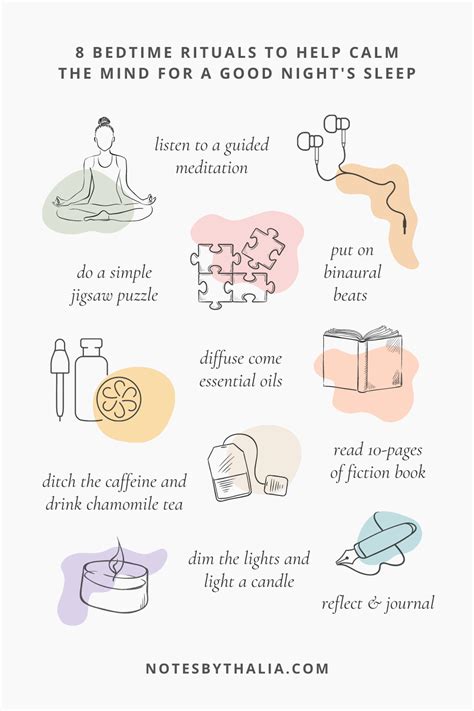Have you ever felt that the quality of your sleep could use a boost? Do you often find yourself tossing and turning at night, unable to achieve a deep and restful slumber? Look no further! We have compiled a collection of valuable insights and expert advice to help you achieve a more peaceful and rejuvenating night's rest.
Within this comprehensive guide, we will explore a variety of proven strategies to enhance the quality of your sleep. By implementing these practical tips, you can unlock the key to a revitalizing and refreshing sleep experience, allowing you to wake up each morning feeling energized and ready to conquer the day.
Discover the power of establishing a consistent sleep schedule, aligning your body's internal clock, and optimizing your sleeping environment for ultimate tranquility. Learn how simple lifestyle adjustments, such as incorporating regular exercise and avoiding stimulants, can have a remarkable impact on your sleep patterns.
Dive deep into the realm of sleep hygiene and uncover the secrets to promoting relaxation before bedtime. Explore the innovative techniques of meditation and deep breathing exercises, which can pave the way for a calm and serene transition into slumber. Additionally, we will delve into the benefits of creating a cozy and peaceful sleep environment, harnessing the power of soothing aromas and comforting sleep aids.
It's time to unlock the secrets to a profound and fulfilling night's rest. Are you ready to embark on this journey towards improved sleep quality and enhanced overall well-being? Join us as we unveil the most effective and practical strategies for transforming your sleep experience and reaping the abundant benefits of a good night's rest.
Creating a Calming Bedtime Ritual

In order to enhance the quality of your sleep and promote a restful night's sleep, it is important to establish a soothing bedtime routine. By implementing a series of calming activities before bed, you can signal to your body and mind that it is time to relax and prepare for sleep. This article explores various strategies and suggestions for developing a relaxing bedtime routine that can significantly improve your sleep quality.
1. Unwind with Gentle Activities Engage in gentle activities that help you unwind and release any tension or stress accumulated throughout the day. This can include reading a book, practicing mindfulness or meditation, doing light stretching exercises, or journaling your thoughts and emotions. |
2. Create a Tranquil Sleep Environment Set up your bedroom in a way that promotes relaxation and tranquility. Adjust the lighting to a soft, warm tone and ensure the room is cool, quiet, and comfortable. Consider using calming scents, such as lavender, through essential oils or a diffuser to create a soothing atmosphere. |
3. Establish a Consistent Sleep Schedule Developing a regular sleep schedule is essential for improving sleep quality. Try to go to bed and wake up at the same time every day, even on weekends. This helps regulate your body's internal clock, making it easier to fall asleep and wake up feeling refreshed. |
4. Avoid Stimulating Activities Before Bed Avoid engaging in stimulating activities, such as watching intense movies or using electronic devices with bright screens, in the hours leading up to bedtime. The blue light emitted by these devices can disrupt your sleep patterns. Instead, opt for relaxing activities that promote tranquility. |
5. Practice Relaxation Techniques Incorporate relaxation techniques into your bedtime routine to calm your mind and prepare your body for sleep. Deep breathing exercises, progressive muscle relaxation, or listening to calming music can help to reduce stress and anxiety, promoting a restful night's sleep. |
By implementing these suggested tips into your evening routine, you can create a calming bedtime ritual that sets the stage for a peaceful night's sleep. Remember, consistency is key, so make an effort to prioritize and commit to your bedtime routine every night for the best results in improving your sleep quality.
Creating a Serene Atmosphere for Enhanced Sleep Experience
Setting the stage for a peaceful slumber: Craft the perfect ambiance to promote restful sleep by designing a tranquil environment tailored to your personal preferences. By creating a serene atmosphere, you can optimize your sleep quality and enhance your overall sleep experience. Ensuring that your sleeping space exudes tranquility is key to achieving a rejuvenating night's rest.
Setting the stage for a peaceful slumber
Begin by decluttering your sleeping area and removing any distractions that may interfere with your ability to unwind. A clutter-free space promotes peace of mind, allowing you to relax and prepare for a restful sleep.
Embrace peaceful elements
Add gentle lighting, such as soft bedside lamps or candles, to create a soothing ambiance. Incorporate earthy tones and natural materials in your bedding and decor to evoke a sense of calmness and serenity.
Enhance relaxation with scents
The power of aromatherapy can greatly contribute to a tranquil sleep environment. Consider using essential oils, such as lavender or chamomile, known for their calming properties, either by diffusing them or using scented candles.
Seclude yourself from outside disturbances
Improve sound insulation in your sleeping area by using heavy curtains, noise-cancelling devices, or earplugs. Minimizing external noise can create a peaceful sanctuary conducive to a deep and uninterrupted slumber.
Temperature regulation
Ensure that the temperature in your sleeping space is optimal for sleep. Experiment with different bedding materials, such as breathable fabrics, to find what works best for you. You may also consider using a fan or a white noise machine to provide a gentle and consistent sound that aids in relaxation.
Personalize your space
Finally, personalize your sleeping area with objects and mementos that bring you joy and serenity. Surround yourself with items that evoke positive emotions and contribute to a sense of calm and harmony.
Creating a calming environment tailored to your preferences can significantly improve your sleep quality and contribute to a more rejuvenating and fulfilling night's rest. Experiment with different elements until you find what works best for you, and enjoy the serenity that comes with a well-rested mind and body.
Avoiding Screens before Bed

Prior to getting ready to sleep, it is crucial to refrain from engaging with electronic devices such as smartphones, tablets, computers, and televisions. Opting out of screen time before bedtime is essential for achieving optimal sleep quality and a restorative night's rest.
Electronic screens emit a type of light known as blue light, which is particularly disruptive to the body's natural sleep-wake cycle. Exposure to blue light in the evening can interfere with the production of melatonin, a hormone that regulates sleep. Consequently, individuals may experience difficulties falling asleep or disrupted sleep patterns when exposed to screens before bed.
In addition to the impact on melatonin production, the content consumed on screens before bed can also contribute to poor sleep quality. Engaging in stimulating or stressful activities through screen time can increase mental arousal and make it harder for individuals to unwind and relax before sleep. This can lead to heightened alertness, racing thoughts, and difficulties in transitioning into a peaceful sleep state.
Avoiding screens before bed can be challenging in today's digital era. However, implementing a few strategies can assist in reducing screen time and improving sleep quality. Establishing a screen-free buffer zone before bed, typically around 1-2 hours, allows the body to gradually wind down and prepare for sleep. This buffer zone can be filled with activities that promote relaxation, such as reading a book, practicing mindfulness or meditation, taking a warm bath, or engaging in gentle stretching exercises.
Furthermore, creating a conducive sleep environment free from electronic devices can help establish a healthier bedtime routine. Keeping screens out of the bedroom reduces the temptation to engage with them and reinforces the association between the bedroom and sleep. This practice supports the body's natural circadian rhythm and promotes a more restful and rejuvenating sleep experience.
In conclusion, avoiding screens before bed is a vital component of improving sleep quality and ensuring a peaceful night's rest. By recognizing the negative effects of electronic screens on sleep and implementing strategies to minimize screen time, individuals can create a sleep-friendly environment that promotes relaxation and enhances overall well-being.
Practicing Relaxation Techniques
Incorporating relaxation techniques into your nightly routine can help promote a calm and peaceful state of mind, aiding in achieving a restful night's sleep. By engaging in these practices, you can create an ideal environment for relaxation and set the stage for a rejuvenating slumber.
1. Deep Breathing: Focusing on your breath is a simple yet effective way to ease tension and promote relaxation. Take slow, deep breaths, inhaling through your nose and exhaling through your mouth. This technique helps slow down your heart rate and activates your body's natural relaxation response.
2. Progressive Muscle Relaxation: This method involves systematically tensing and releasing different muscle groups in your body. Start from your toes and work your way up to your head, progressively relaxing each part as you go. This practice helps release physical tension and encourages a state of relaxation.
3. Mindfulness Meditation: By bringing your awareness to the present moment, mindfulness meditation helps quiet the mind and reduce racing thoughts that may interfere with sleep. Focus on your breath, bodily sensations, or a calming word or phrase to anchor your attention and promote tranquility.
4. Guided Imagery: Utilize the power of your imagination to create calming and soothing mental images that transport you to a peaceful place. Close your eyes and visualize serene landscapes or engage in guided imagery exercises, where an instructor leads you through vivid imagery to induce relaxation.
5. Listening to Relaxing Music: A soothing melody can have a profound impact on your state of mind. Create a playlist of calming tunes or nature sounds that you find personally relaxing. Listening to this music before bedtime can promote relaxation and help you unwind before sleep.
Note: It's important to find which relaxation techniques work best for you and incorporate them into your nightly routine. Experiment with different practices and customize them to fit your preferences, so you can create a personalized relaxation ritual that optimizes your sleep quality and overall well-being.
Simple Lifestyle Changes to Enhance Your Sleep Experience

In this section, we will explore some effortless alterations you can make in your daily routine to promote better sleep and a more restful slumber. By incorporating these simple lifestyle changes into your daily habits, you can enhance the quality of your sleep without the need for any specific treatments or complicated interventions. Implementing these small adjustments can have a significant impact on your sleep routine and overall well-being.
1. Establish a Consistent Sleep Schedule: Regularity is key when it comes to optimizing your sleep patterns. Try to go to bed and wake up at the same time each day, including weekends. This helps regulate your body's internal clock, allowing you to fall asleep more easily and wake up feeling refreshed.
2. Create a Relaxing Bedtime Ritual: Prioritize winding down before sleep by establishing calming activities such as reading a book, taking a warm bath, or practicing gentle stretches. Engaging in relaxing activities before bed can signal your body and mind that it's time to unwind and prepare for restful sleep.
3. Mind Your Caffeine Intake: Be mindful of your caffeine consumption, especially in the afternoon and evening. Avoid or limit the consumption of caffeine-containing beverages or foods, as they can interfere with your ability to fall asleep and stay asleep.
4. Maintain a Comfortable Sleep Environment: Create a serene atmosphere in your bedroom that is conducive to sleep. Ensure your room is cool, dark, and quiet. Invest in a supportive mattress and comfortable bedding to enhance your physical comfort during sleep.
5. Limit Exposure to Electronic Devices: The blue light emitted by electronic screens can disrupt your sleep-wake cycle. Avoid using electronic devices such as smartphones, tablets, or laptops before bed. Opt for soothing activities such as reading a book or practicing relaxation techniques instead.
6. Engage in Regular Physical Activity: Regular exercise during the day can promote better sleep at night. Aim for at least 30 minutes of moderate-intensity exercise, such as brisk walking or cycling, most days of the week. However, avoid vigorous exercise close to bedtime, as it can make it harder to fall asleep.
By incorporating these simple lifestyle changes into your daily routine, you can create a sleep-friendly environment and establish healthy habits that support restful sleep. Remember, small adjustments can lead to significant improvements in the overall quality of your sleep, allowing you to wake up feeling rejuvenated and ready to take on the day.
FAQ
What are some practical tips for improving sleep quality?
There are several practical tips for improving sleep quality. First, establish a consistent sleep schedule by going to bed and waking up at the same time every day, even on weekends. Avoid electronic devices and bright screens before bedtime, as the blue light can disrupt your sleep. Create a comfortable sleep environment by keeping your bedroom cool, dark, and quiet. Limit your caffeine and alcohol intake, especially in the evening, as these can interfere with your sleep. Finally, try relaxation techniques such as deep breathing or meditation to help you unwind before bed.
How does exercise affect sleep quality?
Exercise can have a positive impact on sleep quality. Regular physical activity, such as walking, jogging, or yoga, can help you fall asleep faster and enjoy deeper sleep. It can also reduce symptoms of insomnia and sleep disorders. However, it is important to note that exercising too close to bedtime can actually make it harder to fall asleep, so it's recommended to finish your workout at least a few hours before bedtime.
Are there any natural remedies for improving sleep quality?
Yes, there are several natural remedies that can help improve sleep quality. One common remedy is drinking herbal teas like chamomile or lavender, which have calming properties. Aromatherapy with essential oils such as lavender or valerian can also promote relaxation and better sleep. Additionally, taking a warm bath or shower before bed can help relax your body and prepare it for sleep. Some people find supplements like melatonin or magnesium helpful, but it's always best to consult with a healthcare professional before trying any new remedies.
What should I do if I still have trouble sleeping despite following all the tips?
If you are still having trouble sleeping despite following the tips, it may be beneficial to consult with a healthcare professional. They can evaluate your sleep patterns and provide personalized recommendations. They may suggest cognitive behavioral therapy for insomnia (CBT-I), which is a proven form of therapy that helps address the underlying causes of sleep problems. In some cases, medication may be prescribed as a short-term solution. It's important to address persistent sleep issues, as lack of quality sleep can have a negative impact on overall health and well-being.



